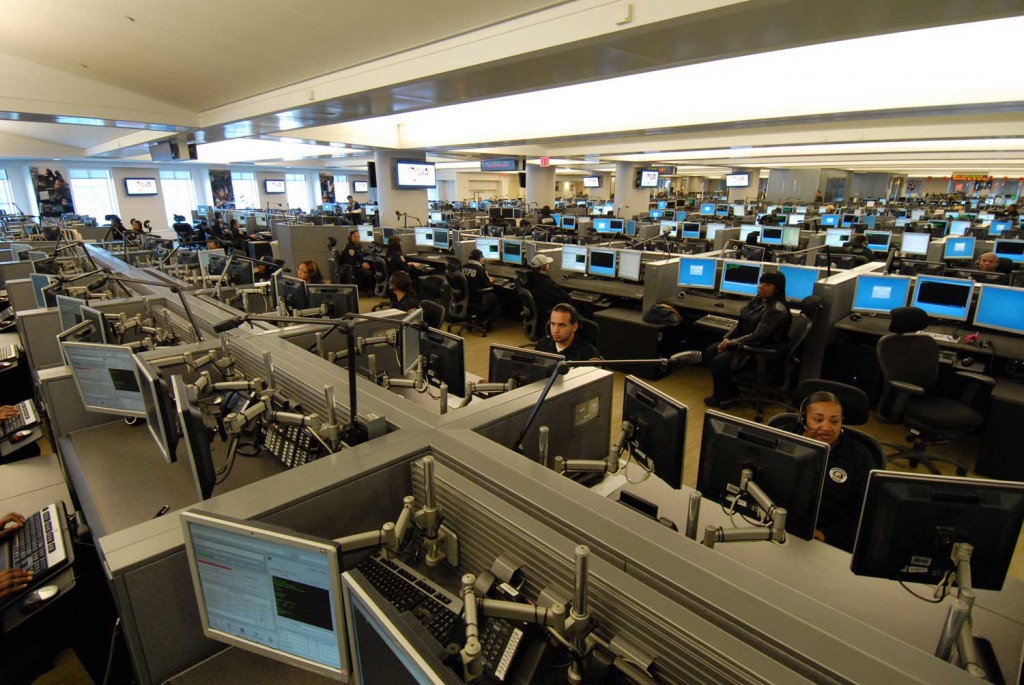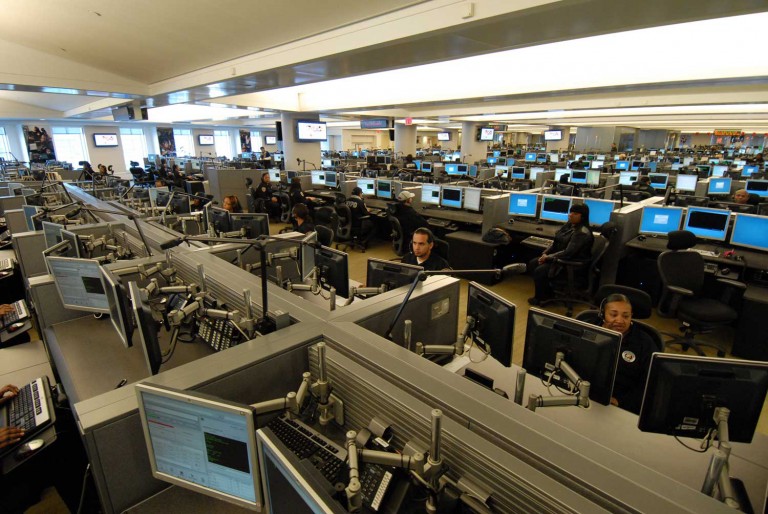Amid mounting criticism of the city’s newly overhauled $2 billion 911 call taking system that has been plagued by a litany of problems from missed and misdirected calls to frequent system crashes, officials have begun to acknowledge that they need to hire more dispatchers to properly handle the city’s thousands of calls each day.
Last Friday, Police Commissioner Ray Kelly spoke to reporters about 911 staffing, following a promotion ceremony at One Police Plaza.
Kelly said that up to 150 additional civilian 911 dispatchers will be hired for the city’s call center in Brooklyn. However, when asked to respond to a recent story from the Daily News about putting close to 300 uniformed officers to work as call dispatchers, the commissioner was vague but did not rule out the possibility.

The city plans to hire 150 more civilian dispatchers in an attempt to fix the 911 system that has been plagued by a long list
of problems. Additionally, the city may be mulling the idea of pulling as many as 300 uniformed officers to work as dispatchers.
The 911 call system is “an emergency service that has to be manned, so one of the things that were discussed and no decision had been made to use police officers perhaps on restricted duty or impact officers in the event of an emergency to be able to man those positions,” Kelly told reporters.
Elaborating on the possibility of using uniformed officers to staff the 911 call center, Kelly said, “They’re first responders, just like the people on the radio calls are first responders – they have to be able to answer those calls and dispatch the resources. So, we have an obligation to make certain that that function remains operating in all circumstances.”
In discussing the 911 computer system itself, Kelly defended the system, calling it much improved.
“This is a much better system than the system we had,” he said of the system that was implemented in 2009. “You’re always going to have some problems with a complex computer system, in every business that’s true. So we think certainly with the professionals we have in the NYPD in the communications division think this system is a quantum of leap beyond the old system.”
Stories about the 911 system’s failures continue to surface almost daily. Recent deaths such as 4-year-old Ariel Russo, a Middle Village girl struck by a car in Midtown, to a woman from the Bronx who died in a fire, have been attributed, in part, to the system’s failure to deliver timely emergency responses.
Still other stories have detailed how 911 operators are being forced to work double shifts and are suffering from high rates of burnout.
But, Queens’ community members aren’t completely sold on the idea of using uniformed officers as 911 dispatchers.
Alexander Blenkinsopp, a Woodhaven resident and member of Community Board 9 – a group that works closely with the 102nd Police Precinct – said it would be better for uniformed officers to be out in the community, responding to 911 calls, instead of sitting in a call center.
“If it’s true that the city’s 911 operators are quitting in droves because they’re burning out from routine 16-hour days and the stress of a new computer system that keeps crashing, then that’s a huge problem,” he said.
While Blenkinsopp said that expanding the 911 staff should be an “urgent priority,” he said that converting uniformed officers into call dispatchers should be only a temporary measure.
He added that some crucial questions for the city include why 911 call staffing has gotten so bad and why has the new $2 billion computer system caused so many problems?
“You don’t overhaul an airplane mid-flight,” he said. “That principle should also apply to our 911 system, because lives are hanging in the balance.”
Bob Holden, president of the Juniper Park Civic Association, which works closely with the 104th Police Precinct, said he likes the idea of adding 300 uniform cops to 911 dispatch duty.
“The technical glitches aside, the big problems that I have experienced with the system are the 911 operators,” Holden said, noting that many are unqualified and/or poorly trained.
“Many have to ask you numerous times how to spell simple words, and I can’t tell you how many operators simply are not listening,” Holden continued. “You have to repeat yourself over and over and this wastes valuable seconds.”
Holden also pointed out that there are not enough officers on patrol to handle the calls that do get through.
“Many patrol cars in the 104th Precinct are handling four to five jobs at the same time,” he said. “That’s a recipe for disaster. The answer is we need more cops both on patrol and dispatching.”
But, while Frank Gulluscio, district manager for Community Board 6, agreed that more cops are needed on patrol, he is not a fan of diverting uniformed officers to be dispatchers.
“Anytime an officer is taken off the street, it’s a detriment to the community,” Gulluscio said, adding that he also doesn’t like the idea of using cops who were on restricted duty.
“I would prefer the department just hire new 911 dispatchers,” he said.
Gulluscio, calling the 911 situation serious, said that at end of the day, his real concern is having cops on the street.
Maria Thomson, a member of the 102nd Precinct Community Council and executive director of the Greater Woodhaven Development Corporation, agreed.
“I think [the NYPD] should leave uniformed officers in the street, where they belong, to fight crime. I think they should hire additional people…and have these people do the job,” Thomson said. “They must train people well and, of course, the call-taking system has to work.”
Echoing Gulluscio, Thomson said she was “very concerned” about the overall system.
“That is our lifeline, the 911 system,” she said. “While the city works out the system’s kinks, people’s lives are being put in jeopardy.”
By Alan Krawitz

